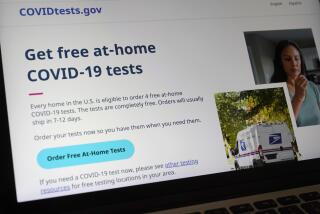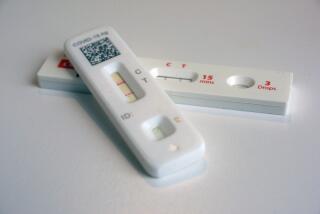Google website can help you get tested for coronavirus â so long as you arenât sick
After several days of mystery around the nature of a website touted by President Trump as Googleâs solution to the problem of getting people tested for the new coronavirus, an initial version of the site appeared online Sunday night. But if youâre feeling sick, donât expect it to help you get tested faster.
The pilot site is part of Project Baseline, a health-and-disease-tracking initiative operated out of Verily, one of Googleâs sister companies under the Alphabet umbrella. According to Google, the site âwill enable individuals to do a risk assessment and be scheduled for testing at sites in the Bay Area.â
A new visitor to the site hoping to get tested must first answer a yes/no question: âAre you currently experiencing severe cough, shortness of breath, fever, or other concerning symptoms?â
If you answer âyes,â the screening ends abruptly with this message: âBased on your symptoms, in-person COVID-19 testing through this program is not the right fit. We suggest that you seek medical attention.â
What use is a website that screens for testing by screening out anyone who might actually need a test? By email, a Verily spokesperson said turning away the sick âis meant to ensure that anyone who has severe symptoms does not visit our mobile testing sites because they are not prepared to provide acute medical attention.â
The spokesperson said the screener was âdeveloped in partnership with government health officials,â adding, âWe are early in this pilot and are going to be learning more that will help us refine ... risk screening and testing.â
The language in the FAQ section of the site suggests, however, that exhibiting symptoms should be a criterion for inclusion, not exclusion. âThis program is first focusing on high-risk populations as advised by national guidelines and the California Department of Health,â it reads. âThis will include those who may be exhibiting symptoms and have other risk factors.â
One possibility: Rather than focusing on those currently ill with the novel coronavirus, Project Baseline, as its name implies, is focused on establishing the baseline prevalence of infection in the wider population, a question that has been hard to answer in the U.S. given the shortage of tests here. The companyâs past public health efforts have included analyzing web searches to try to detect patterns that indicated new flu outbreaks, something it attempted without notable success.
Also unclear is whether Google was anywhere close to being ready to go public with the project when Trump floated it in a Friday news conference, claiming that the company had tasked 1,700 engineers to it and was days way from launching the site on a nationwide basis. According to CNBC, Google Chief Executive Sundar Pichai had learned about Verilyâs undertaking only the day before.
When reporters from The Times and other outlets sought to confirm Trumpâs statements, Google was equivocal, leading some to conclude Trump had misrepresented the enterprise. After Google confirmed additional details of Trumpâs account on Saturday, the president falsely accused reporters of neglecting to contact the company before jumping to conclusions. He reiterated that charge in a news conference Sunday and asserted that Pichai had apologized to him for the confusion.







